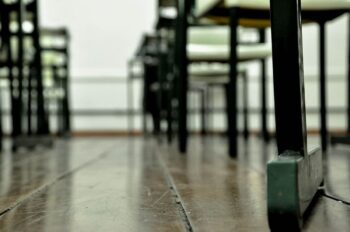 At least 13 and possibly more religious settings have been investigated for operating as illegal schools according to new data published by Ofsted this week. Humanists UK, which leads the national campaign against illegal religious schools, expressed concern at the figure but says it is likely to be ‘just the tip of the iceberg’ with respect to the true extent of the problem because of the limited powers school inspectors currently have to get a full picture of what is happening in such settings.
At least 13 and possibly more religious settings have been investigated for operating as illegal schools according to new data published by Ofsted this week. Humanists UK, which leads the national campaign against illegal religious schools, expressed concern at the figure but says it is likely to be ‘just the tip of the iceberg’ with respect to the true extent of the problem because of the limited powers school inspectors currently have to get a full picture of what is happening in such settings.
Latest findings
According to the latest Unregistered Schools Management Information, which has been updated to cover the period between the 1 September 2019 and 31 March 2020, inspectors have investigated five Christian schools, one Jewish school, and seven Muslim schools in the past seven months. During this time, they have also inspected a further 39 settings of either ‘no faith’ or ‘unknown’ faith character. However, because inspectors are not always able to ascertain the religious character of a setting and lack the power to seize evidence that may help them to establish it, it is possible the number of religious settings is higher than the figures suggest.
The issue is further complicated by the fact that Ofsted records data for settings which identify themselves as ‘places of religious instruction’ as well as those providing ‘general education’ — but faith settings can in fact belong to either category.
The wider picture
Since the establishment of the unregistered schools unit in 2016 – which followed various media exposés by Humanists UK and the BBC – inspectors have investigated over 100 places of religious instruction, as well as a further 184 settings providing general education, the proportion of which is religious is not fully known.
When they have a religious character, illegal schools tend to provide a curriculum that is extremely narrow in scope. They are usually deeply religiously conservative, intolerant, and extreme in outlook. Investigations have also found inappropriate teaching materials, including ‘books by people banned from entering the country’ and ‘books advocating men beating their wives as punishment’ on school sites.
Illegal schools are also typically unsafe, with reports citing problems such as unqualified, unvetted teachers; corporal punishment; inadequate safeguarding; and serious health and safety problems, including rat traps in classrooms, holes in walls, and exposed electrics.
Legislation needed
Earlier this year, the Government launched a public consultation on measures designed to close loopholes in the law that allow illegal schools to continue operating. This included widening the definition of full-time education so that places of religious instruction that provide their pupils’ only education will no longer be able to avoid having to register as a school because their narrow curriculum isn’t suitable for primary or secondary aged pupils. The consultation also proposed giving the Government stronger powers to close any further loopholes opened up by new regulations being exploited by unscrupulous providers as well as to shut down failing independent schools more quickly.
Humanists UK strongly supported the proposals. However, the consultation process was abruptly suspended, citing the coronavirus crisis, and it is not yet understood if and when it will run again.
Humanists UK Education Campaigns Manager Dr Ruth Wareham said:
‘These figures demonstrate that religious settings continue to form a significant and growing part of the problem of unregistered schools. However, owing to the lack of a proper regulatory system and sufficient powers for Ofsted inspectors to consider and seize evidence, it is likely that they represent just the tip of the iceberg with respect to the true extent of the issue.
‘Illegal religious schools expose their pupils to a range of distinctive harms, including inappropriate, narrowly faith-based curricula, misogynistic and homophobic materials, and even extremism. And this is to say nothing of the serious failures in safeguarding and use of corporal punishment reported in these settings.
‘For this reason, we were extremely disappointed to learn that the public consultation on proposals designed to tackle many of these problems has been suspended. Rest assured, we will be doing all we can to clarify the situation and strongly urge the Government to treat the health, safety, and education of pupils at risk in illegal schools as a matter of urgency as soon as they have the capacity to do so.’
Notes:
For further comment or information, please contact Humanists UK Education Campaigns Manager Ruth Wareham at ruth@humanists.uk or phone 020 7324 3000 or 0772 511 0860.
Read our most recent article on the ‘manifesto for corporal punishment’ endorsed by religious leaders
Read our article on our response to the public consultation on tightening the law on illegal schools
Read our latest article on why Government must move fast in crackdown on illegal schools
Read more about Ofsted’s frustration on Government inaction on illegal schools
Read more about our work on illegal schools
Humanists UK is the national charity working on behalf of non-religious people. Powered by over 85,000 members and supporters, we advance free thinking and promote humanism to create a tolerant society where rational thinking and kindness prevail. We provide ceremonies, pastoral care, education, and support services benefitting over a million people every year and our campaigns advance humanist thinking on ethical issues, human rights, and equal treatment for all.
